|
User
Reviews 20
Approval 100%
Soundoffs 111
News Articles 1
Band Edits + Tags 203
Album Edits 401
Album Ratings 2445
Objectivity 65%
Last Active 04-14-20 1:52 am
Joined 01-24-16
Review Comments 5,398
| Fiddy's Top Classical Pieces, Vol. 2
Same deal as last time; 15 pieces, one composer each. I’ll try to use completely different composers this time around, as I don’t necessarily want to tread the same ground. Therefore, this is not an extension of the last list, but rather a continuation of its concept. I might’ve already included a composer you really like on a previous list. | | 1 | 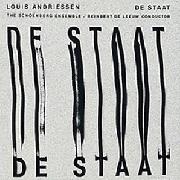 | Louis Andriessen
De Staat
Louis Andriessen - De Staat
Andriessen was a very pleasant surprise that came out of quarantine. He is polystylistic, much like Schnittke, but with more of a playful, schizophrenic nature. That being said, De Staat is easily one of the greatest pieces I’ve heard. Andriessen combines minimalist leanings, choral elements, and incredibly textured soundscapes to create a modern masterpiece. The piece is one of the most intense musical experiences I’ve had; my heart raced as I listened to it. It is gorgeous and exciting in ways I simply cannot describe. The fact that it is also a scathing critique of Plato and his notions of music in politics make it all the more rebellious and better.
Honorable Mentions: De Stijd, M is For... (hilarious piece, in the best way possible) (also, I just discovered him so I don’t know him that much lol sorry) | | 2 | 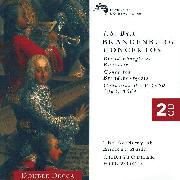 | Johann Sebastian Bach
The Brandenburg Concertos
J. S. Bach - Brandenburg Concerto No. 5
I’m still diving into Bach’s repertoire, but goddamn. It’s so incredibly extensive and honestly quite intimidating to tackle. On my routine excavations of his oeuvre, I found the Brandenburg Concertos and boyyyy, I loved them. Bach’s mastery of structure, form, and sheer musicality is perfectly seen on them. I especially love No. 5 because it has some of the best violin lines I’ve ever heard and what may be my favorite key-related solo of all time (insaaane chromatic runs on the harpsichord). If you want to get into Bach at all, this is an excellent place to start.
Honorable Mentions (that I know of): Brandenburg Concertos, Mass in B Minor, Matthaus Passion, St. John Passion, The Well-Tempered Clavier, The Art of Fugue, organ works, and so many others lmao I guess this is just a good place to start | | 3 |  | Luciano Berio
Acousmatrix - The History of Electronic Music VII
Luciano Berio - Visage
Ah, yes. The man, the myth, the legend. Berio’s voice as a composer is quite unique, as the vision for his pieces is often incredibly original and challenging. Visage is, in my opinion, one of his most successful experiments. The piece is built on blocks of language but in an exclusively phonetic matter to express the spectrum of human emotion. Sound blocks from Arabic, Latin, and a few others are used to, effectively, build a wordless language. Of course, the fact that it’s a tape piece also makes it eerie and somber but quite moving.
Honorable Mentions: Sinfonia (musical quotes for dayyysss), Momenti, Passaggio, Sequenzas (there’s sooo many), Nones, Concerto for 2 Pianos (so goooood), Formazioni | | 4 | 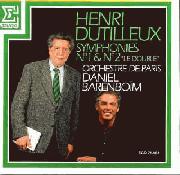 | Henri Dutilleux
Symphony No. 2 "Le Double"
Henri Dutilleux - Symphony No. 2 “Le Double”
Horribly, criminally overlooked. Like, too overlooked. Dutilleux’s music is intense but still incredibly melodic, much like Stravinsky but with a COMPLETELY different voice. Without a doubt, Dutilleux is one of the most complete composers I have ever heard. Listen to his symphonies to get a taste; he explores atonality much like Schoenberg but, again, in a highly melodic and intense manner. I prefer his second symphony because of its fantastic interaction between sections of the orchestra. He basically isolates 12 musicians that make up a soloistic section which contrasts the rest of the orchestra utilizing polyrhythms, polytonalities, and other delightful tricks of the trade. In other words, it is a through-and-through, excellently composed modern symphony.
Honorable Mentions: Symphony No. 1, and basically all his orchestral material lmao | | 5 | 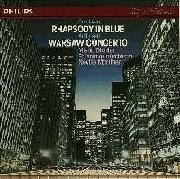 | George Gershwin
Rhapsody in Blue
George Gershwin - Rhapsody in Blue
It is always interesting to see modern classical composers’ takes on jazz. Shostakovich, Stravinsky, and a few others attempted to utilize aspects of the genre to relative success. However, Gershwin’s Rhapsody in Blue is one of the most successful, widely-acknowledged experiments of such kind. It is basically a piano concerto that incorporates aspects of big-band 1920s jazz. In my opinion, its greatest success is in showing modernist extravagance, excesses, confusion, and disillusionment. It is also a very enjoyable piece as a whole, very exciting. Best heard whilst reading The Great Gatsby.
Honorable Mentions: Porgy and Bess, American in Paris | | 6 |  | Gyorgy Ligeti
The Ligeti Project II
Gyorgy Ligeti - Apparitions
Does he need an introduction? A composer known for his modeling of electronic clusters and alien soundscapes on acoustic orchestration. His electronic works are also class. Regardless, this one sounds like it has a life of its own, almost like it breathes into your ear. It’s haunting, beautiful, and paranoia-inducing all at the same time. It is almost like a bad omen, yet one incredibly rewarding all the same.
Honorable Mentions: San Francisco Polyphony, Concert Romanesc, Requiem (those cluster chords, damn), Lux Aeterna, Organ Studies No. 1 | | 7 | 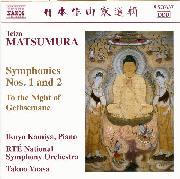 | Teizo Matsumura
Symphony No. 1
Teizo Matsumura - Symphony No. 1
Ah, an Asian composer! Thank you, Zig, for recommending this composer. Teizo’s music is very dense, colorful, and organic. Zig said his first symphony sounds strongly influenced by Ravel and Stravinsky, and I couldn’t have said it better. It feels like a foreign, eerie, rich take on impressionism. It’s pretty incredible, and Matsumura is hardly even known, which is sad.
Honorable Mentions: Symphony No. 2, To The Night of Gethsemane | | 8 |  | Alexander Mosolov
Iron Foundry; Piano Concerto No. 1; Legend...
Alexander Mossolov - Tractor’s Arrival at the Kolkhoz
Much like Dutilleux earlier on the list, Mossolov is so criminally overlooked that it genuinely hurts. The man was the pioneer of futurism in music, which would later greatly influence metal and industrial music. Regardless, check his stuff out; start with the Iron Foundry, then go with this one. The Iron Foundry is pulsating, mechanical, industrial, but I like Tractor’s Arrival better. The latter beautifully shows the conflict between industrialization and tradition, and how that influenced the means of production in Russia. Oh, and his piano works are also excellent.
Honorable Mentions: Iron Foundry (Zavod, Symphony of Machines), Legend, Sonata for Piano No. 2 (heavy af), Deux Nocturnes (heavier af) | | 9 |  | Modest Mussorgsky
A Night on Bald Mountain
Modest Mussorgsky - Night on Bald Mountain
Well, well. Did you click on this list to look for some accessible classical jams? Maybe you wanna get into the genre? Good, this one's for you. Night on Bald Mountain (often called Night on the Bare Mountain) is a brilliantly composed, thrilling, epic joyride. Absolutely one of the most easily enjoyable classical pieces ever, and one you really cannot go wrong with. Metalheads tend to love it for a reason; it riffs. Just listen to it.
Honorable Mention: Pictures at an Exhibition (duh) | | 10 | 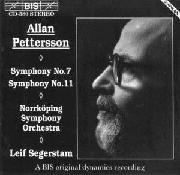 | Allan Pettersson
Symphony No. 7; Symphony No. 11 (Norrköping)
Allan Pettersson - Symphony No. 11
Pettersson almost brings to mind a modern Mahler; his symphonies feel all-encompassing, massive, and epic (although they’re shorter). His 11th is fucking stellar. The sweeping soundscapes, the percussive intersections, the swelling that reaches manic craze. The feeling of anguish mixed in with heroism. So. Epic. Ugh. It does not waste any second of the 25-minute runtime, and it hardly gets any better than this. If you’re looking for modern, musical, large-scale orchestral works, Allan Pettersson is your guy. His life story is also fascinating in case you feel like doing extra research.
Honorable Mentions: All symphonies | | 11 | 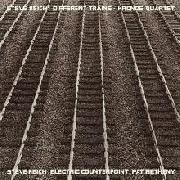 | Steve Reich
Different Trains/Electric Counterpoint
Steve Reich - Different Trains
Different Trains really does feel like going on a train; unstoppable, exhilarating, alluring, and mechanical at the same time. It feels like life is passing before me, as if time is fleeting, and I can’t help but sit back in sheer wonder. The way Reich incorporates sampling throughout is nothing less than stellar, and even revolutionary as well.
Honorable Mentions: Music for 18 Musicians (duh, his best piece but I'd spend too long talking about it lmao), Piano Phase, Electric Counterpoint, Tehilim, Music for a Large Ensemble, Octet | | 12 |  | Nikolai Roslavets
Complete Music for Cello and Piano
Nikolai Roslavets - Razdum’ye (Meditation)
Ah, another obscure Futurist Soviet composer. You can tell I spend too much time looking for composers online. Regardless, Razdum’ye is a highly atmospheric piece with fascinating conversations between the cello and piano. It can feel alienating at times, but I almost find it introspective, hypnotic. It is like staring at yourself in a mirror for too long. The composition is top-notch and Roslavets reeeaaally knew how to compose for cello. I especially recommend him if you dig Scriabin; Roslavets built upon a bunch of his concepts.
Honorable Mentions: Dance of the White Maidens, Cello Sonatas, Five Preludes | | 13 | 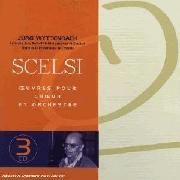 | Giacinto Scelsi
Scelsi: Oeuvres pour orchestre
Giacinto Scelsi - Quattro Pezzi Su Una Nota Sola
Perhaps my new favorite composer ever. Scelsi’s voice as a composer is like no other; it is characterized by microtonal oscillations around a single note to create sweeping, gorgeous, massive soundscapes (his masterful arranging also helps achieve such means). The result is somewhat similar to Ligeti’s oeuvre, but entirely different. They’re both ambient-feeling and ever-evolving in nature, yet Ligeti remains inhumane and alien whilst Scelsi’s music feels deeply meditative and humanistic. It feels like the collective subconscious’ continuous humming, like a return to the most primitive of music. It is almost minimalistic, but not really. His signature microtonal approach is exemplarily seen on Quattro Pezzi, which for me stands out for its prevalent brooding tone. It's not my favorite of his, but it's a great place to start and perfect regardless. Must. Check. | | 14 |  | Giacinto Scelsi
Scelsi: Oeuvres pour orchestre
Honorable Mentions: All orchestral/choral works, Trilogie, Khoom, String Quartets, Solo works for double bass, Natura renovatur, Ohoi, Ave Maria, Ygghur (the rest of Trilogie is also great, but this is one of the greatest moments in music ever), Anagamin | | 15 | 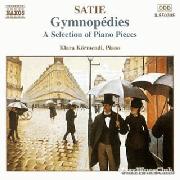 | Erik Satie
Gymnopédies
Erik Satie - Gymnopedies
The madman himself. Some people got “angry” (not really, but you know what I mean) that he wasn’t on my last list. Ah well, better late than never. Satie’s combination of motivic development, ambiance, and melodic passages is a delight to any listener. His approach is most iconically seen on the Gymnopedies, gorgeous solo piano pieces that stand the test of time across cultures. They’re accessible, perfectly composed, and a fleeting moment of serenity (or existential submission, or existential dread, your take). You must experience them at least once.
Honorable Mentions: All piano works, essentially | | 16 | 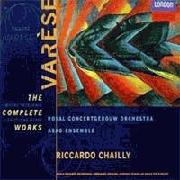 | Edgard Varese
Varèse: The Complete Works
Edgard Varese - Amériques
Choosing only one Varese piece breaks my heart. All his work is so deeply provocative, innovative, and well-executed. He (almost) had the nuance of Webern, the imposing presence of Stravinsky, and the forward-thinking mind of Xenakis, yet stood and felt completely his own. Varese knew how to dominate and manipulate sound as desired as little other composers could. Amériques is a piece that shows his versatility as an arranger and composer, utilizing musical quotes and original ideas in incredibly creative and awe-inspiring ways. It is intense, thrilling, and a sonorous shotgun blast to the face. Don’t sleep on it.
Honorable Mentions: Complete works (he didn’t make much music anyway, but it’s all perfect) | |
50iL
04.11.20 | I decided to leave Spotify links to my favorite pieces this time around. I'll do the same for my other list.
Here is the doc with all the links:
https://docs.google.com/document/d/15xPh2T6laerlItRSddBl3Y_-HRTFcxp-PSOuXsxPg0E/edit?usp=sharing | Josh D.
04.11.20 | Gonna need to see some Camille Saint Saens soon | 50iL
04.11.20 | Sure thing! I really dig a few Saint Saens pieces, I could include him easily :) | 50iL
04.12.20 | Bmup | neekafat
04.12.20 | cool shet bro (: | 50iL
04.12.20 | Thanks man! | Havey
04.18.20 | get the flute & piano works on cpo too if you’re a scelsi fanatic, the krishna e radha recording is the only one i’m aware of where scelsi himself is playing | Bedex
04.18.20 | bookmarked potatobro
but first I gotta check those Guatemalan bands you rec'd me :] | 50iL
04.20.20 | Oh shit, I didn't see this got more comments. Thank you! I will do so on the Scelsi recordings, thank you tons :) |
|
